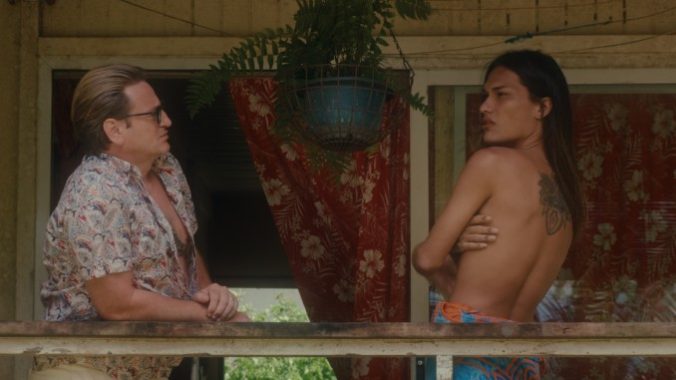Albert Serra Talks Not Using Scripts, Avoiding Clichés, and Pacifiction

Catalan classicist and arthouse hellion, Albert Serra is a rare breed of auteur that–20 years into a singular career–has only recently drawn attention from the U.S., whose cinematic head his previous five features have soared over with the jet stream ferocity of a confident, evolutionary artist. But his newest–Pacifiction, which debuted in competition at Cannes–offers more mood, visual aesthetic and momentum for the average moviegoer to grab onto.
The narrative is as nebulous as ever. In the radiant pastel glow of slow, droning Tahitian island life, a French foreign dignitary wrestles with his dawning insignificance in the phantom political machine he’s always served. But the mystery creates an enveloping tone–one heightened by the immersive experience of dodging beautiful, life-ending waves on a jet ski or discussing flippant nuclear tactics with a military general in the club. The music is languorous, the conversations intriguingly veiled, the gauzy light intoxicating, the pace meditation-inducing, and the source of tension almost always invisible.
Writer-director Serra splits his time between Barcelona and Paris like he splits his directorial efforts between strict formal classicism and unnerving new wave subversion. Where the misguided filmmaking renegade wrecks tradition to create something so uncinematic it could be an ad, Serra’s punk outlook lends him to a fresh cinematic language imbued with the wisdom of film history and the daring of modern art. He is uncompromising in his several-minute shots, unpopular subjects, interest in sexual perversion and unapologetic approach to new, more challenging, often less likable kinds of films. And Pacifiction is his most breathtaking yet.
With the film’s recent arrival stateside, Paste sat down to talk with Serra about it:
Paste Magazine: You’ve made six features and this is your first in the modern era. Why did you break from the period piece?
Albert Serra: Just to do something different. At the end, I’d realized that choosing this exotic place where I didn’t know anything going there, in fact, was not so far from making a film about history, a period film. Because everything is totally unknown, it’s a reality you don’t know. And, in fact, I think that even if I tried one day to make something that is really my world around me, it would be detached somehow. It would be separated. So, I realize that maybe period films are a metaphor for all kinds of films when you do it the way I do it, the way I shoot it, in my perspective. You can imagine what I’m referring to: The three cameras, not checking the image, you know, just being the spectator a little bit outside your own film and trusting what the camera does, what the camera can discover, and treating all elements as opaque elements. It’s the same then with history, you know. You don’t know anybody from that period, and you have to trust the visual elements, and that’s all. So, here in this exotic place it was a little bit the same. But this I discovered after. I really thought that I would be closer to the subject somehow. Because I created the subject. I never do research or anything like that, but I like to randomly get closer–especially before writing the script–with the ambience of the place. But then, I don’t know, it was not so different. I didn’t see a huge difference. Except that people love it better. Because, I don’t know, they can recognize, they can see things of their own world.
Did you feel like that might happen while you were writing it?
[Scoffs] No, no. When the film was finished and we were showing it to the Cannes selection committee, we didn’t know anything. We didn’t have time to adjust to see the film. We didn’t have time this time to show it to anybody. So we really submitted to Cannes and nobody had seen it, except the producers. But usually I show it to friends of mine, to random people, diverse kinds of people with different backgrounds just to understand. I like it. “Did you find this boring? Did you understand this? Did you, you know, like this character? Did you like this costume?” Questions like this, just to understand the impressions of people. But, in this case, we couldn’t. So I don’t know, I was totally blind with the film.
Do you like any of your films more than others?
Yes. With time. You really will wait. You like more the ones that open some doors maybe that you are dealing with still. That it gives you some…for me, Story of My Death was a very important turning point, you know? Inflection point. Because, I don’t know, a lot of things. The way I work with dialogue. The roughness of really building a character from nothing, from zero.
Why do you choose so often to linger on faces in scenes without dialogue? If someone’s talking, that’s one thing. But lingering on someone in thought, mid-drink, more inactive moments.
-

-

-

-

-

-

-

-

-

-

-

-

-

-

-

-

-

-

-

-

-

-

-

-

-

-

-

-

-

-

-

-

-

-

-

-

-

-

-

-








































